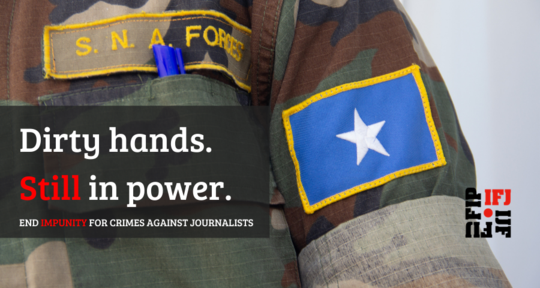Somalia is one of the most dangerous countries for journalists in Africa and presents a real risk of death for journalists. Corruption and insecurity are a serious obstacle to press freedom, while journalists were killed in crossfire, bombings, terrorist attacks or in targeted attacks.
Since 2010, 57 journalists have been killed, with the deadliest year being 2012 with 18 killings. The level of impunity remains at its highest as, until the date, only 4 killers have been punished.
The appointment of a Special Prosecutor perceived as positive step forward
Despite the difficult situation of journalists in Somalia, there are also some encouraging developments in the country towards the end of impunity. In September, the National Attorney General Suleyman Mohamud appointed a Special Prosecutor for journalists’ crimes. The appointment was result of the National Union of Somali Journalists (NUSOJ) campaigning and actions, who filed a legal action at Banadir Regional Court in Mogadishu and pushed for moves against impunity. In response to this petition, the court ordered the Attorney General Office to urgently investigate the killings of journalists and then appointed the Special Prosecutor.
Furthermore, Somalia’s President, Mohamed Abdullahi Mohamed Farmaajo announced to revise Somalia's Penal Code, which dates from 1964, to make sure it is not used against journalists or to restrict freedom of expression. According to the NUSOJ, provisions in the Penal Code criminalize certain types of expression and are routinely used to arrest and judicially harass journalists.
Both were key development in Somalia, where there is still widely entrenched impunity for these crimes. In its annual report, the NUSOJ points that both the Federal and State police and senior officials of regional administrations benefit from this impunity context. At the time of this report being released, many of the journalists attacked are still awaiting justice, while there is just a few ongoing investigations of killed journalists.
The appointing of a Special Prosecutor for journalists’ crimes should be a significant step and a sign of political will to end with the high impunity levels in Somalia.
Two journalists killed since the beginning of the year
The current violence towards journalists in Somalia is high and comes in many forms.
On 16 February 2020, freelance radio and TV journalist Abduwali Ali Hassanwas returning from an assignment when unknown gunmen opened fire on him in the town Afgoyein the Lower Shabelle region. While being transported to Mogadishu hospital, he succumbed to his wounds. Journalists working in the region said that Ali Hassan had received threatening phone calls from hidden numbers and suspected his murder to be in connection to his reporting over manoeuvres of the National Army in the region.
On May 4 2020, journalist Said Yusuf Ali,who was working for the privately-owned Kalsat TV, was killed in Mogadishu when he was coming back home from work. He was stabbed four times in the neck and chest by an unknown individual. Police referred to the attack as a “calculated killing” and is also investigating a woman allegedly involved in the murder.
Media workers also suffer the menace of terrorist groups such as the Al-Shabab movement, which has been active since 2006 and is responsible for the death of several journalists. In 2019, TV journalists Mohamed Omar Sahal and Hodan Nalayeh were killed in a bomb attack on a hotel by the Al-Shabaab militants. Cameraman Abdinasir Abdulle Ga’al died in a bomb blast targeting a local military base in the southwest of Mogadishu.
The impunity level of these crimes is at its record. According to NUSOJ, only three journalists’ killers from Al-Shabab have been prosecuted, sentenced to death and executed by firing squad. The union welcomed the prosecution of journalists’ killers but stands against death penalty.
Permanent harassment from the authorities
Besides physical attacks, torture and killings, the Somali authorities are arbitrarily closing media outlets and arresting journalists for reporting on controversial topics in clear attemps to intimidate them. For instance, since the beginning of this year, three journalists have been detained for covering rape cases.
It is the case of Voice of America reporter Mukhtar Mohamed Atosh, who was arrested on 20 April following his reporting on the rape of a 14-year-old girl who died after. He was released on bail two days after his arrest.
In addition to this, Somali local radio journalists Khadar Awl Ismail and Abdiqani Ahmed Mohamed were arrested in Garowe, Puntland, on 6 September after asking a regional court for a reaction on the case of a woman who was also raped and murdered. They were both released on bail the day after.
Omar Faruk Osman, NUSOJ Secretary General, said: “Impunity for crimes against journalists in Somalia remains the norm, a fact thatproves why Somalia needs strong and sustained national and international pressure to end impunity and ensure justice for all the victims. Perpetrators of crimes committed against journalists must know that our push for genuine accountability for Somali journalists will not stop and our campaign to turn the tide on impunity will not relent”.

